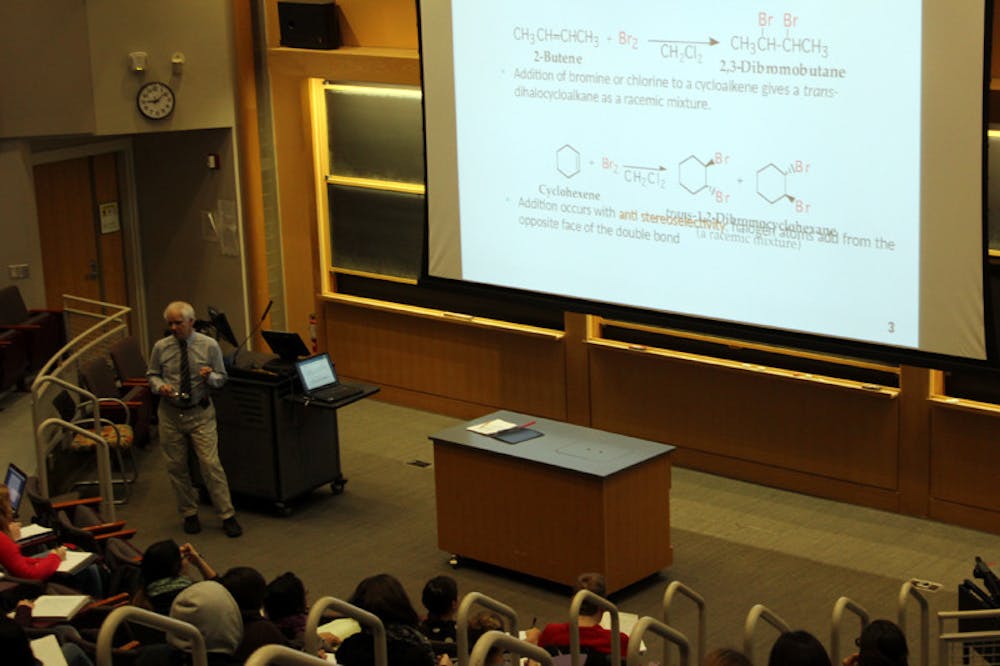With a new professor, different textbook and an unusually high average on the first midterm, the material of the infamous weed-out course CHEM0350: “Organic Chemistry” underwent marked changes this year.
Paul Williard P’11, professor of chemistry, currently teaches one section of the class, which he last taught in 2004. Williard said the Department of Chemistry has rebooted the course to focus less on specifics, so as to cover a wider range of topics that were previously left out of the curriculum, such as carbohydrates, amino acids and polynucleotides. In previous years, there was “way too much in terms of irrelevant information,” he said.
Many students have been talking about the high average on the first midterm — 86 percent, compared to last year’s 78.2 percent. This semester, between 40 and 45 students also scored perfect 100s.
Abid Haseeb ’16, a teaching assistant for the course, said the purpose of the first midterm was to establish the basics of the course, and that the professor had expressed that the class would pick up in the coming weeks.
Williard has not yet determined the grade cutoffs for the course and will base these numbers on the performance of the class as a whole, Haseeb added. “It may end up being as difficult to get an A in the class as before,” Haseeb said.
Williard said of the course’s tests, “I think it’s a different style of what we’re asking in the questions.”
May Siu ’15, who took the course last year, said she heard that students found the test easy, even turning in their exams before the allotted time was over.
Darius Chyou ’16 shopped organic chemistry last year and is currently taking it this semester. He said the course this year is much simpler, adding that exam questions are no longer as tricky or specific. “Everything we learned is the same, it’s just that the testing is different,” Chyou added.
Chyou said the challenge orgo presented last year motivated him to work harder for a better grade. “It was more exciting, but at the same time really stressful,” he said.
Siu said she enjoyed the course when she took it because the tricky questions taught her to problem-solve and students taking the course this year may not learn the same critical thinking skills.
Ashley Wu ’16 also took organic chemistry last year and said she enjoyed the class for being challenging and fast-paced, but that it provided unnecessary stress for students. “Sometimes it’s dangerous to their mental health,” Wu said.
Widespread dissatisfaction among former students brought about the decision to change the textbook, Williard said. Previously, the University used an edition by Joseph Hornback, a professor at the University of Denver, but has since switched to one written by William Brown, emeritus professor of chemistry at Beloit College, and a team of co-authors, Haseeb said.
Wu said she was glad to see a development in the curriculum this semester. It shows that “we’re growing, and the curriculum is growing,” Wu said.
But not all agreed. The changes in the course are not fair to students who took it in previous years, Chyou said, though he admitted it is extremely difficult for universities to standardize their courses, especially with different professors.
Siu said the fact that the course used to be so difficult was unfair. “Some of my friends say there should be a note on the transcript,” indicating that the course was changed, Siu said, adding that she thinks there should be a more challenging class for chemistry concentrators and a less intense route for non-concentrators.
Kareem Osman ’14, head teaching assistant for organic chemistry, said it is currently too early to judge the difficulty of the course. Many students still struggle with the material, he added.
Both Williard and Haseeb also noted that the first midterm does not necessarily indicate the overall difficulty of the course.
Ultimately, professors aim to make students understand and appreciate organic chemistry, and the means of achieving that this year may simply be different than before, Haseeb said.
Correction: A previous version of this article misidentified the creators of the textbook that students in CHEM 0350: "Organic Chemistry" are using this semester. The textbook was created by William Brown, a professor emeritus at Beloit College, and a team of co-authors, not Brown University. A previous version of this article also stated that Darius Chyou ’16 dropped organic chemistry last year and is retaking it this semester. In fact, he shopped the course last semester. The Herald regrets the errors.

ADVERTISEMENT




